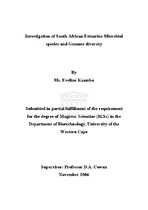| dc.contributor.advisor | Cowan, Don A. | |
| dc.contributor.author | Kaambo, Eveline | |
| dc.contributor.other | Dept. of Biotechnology | |
| dc.contributor.other | Faculty of Science | |
| dc.date.accessioned | 2013-08-27T14:09:48Z | |
| dc.date.available | 2007/08/06 13:11 | |
| dc.date.available | 2007/08/06 | |
| dc.date.available | 2013-08-27T14:09:48Z | |
| dc.date.issued | 2006 | |
| dc.identifier.uri | http://hdl.handle.net/11394/2015 | |
| dc.description | Magister Scientiae - MSc | en_US |
| dc.description.abstract | A study of the microbial diversity in sediments of the Great Berg River estuary is carried out using modern molecular phylogenetic methods. The aim of this study was to determine the effect of (pollution by) the effluents of the fish industry on the composition of the microbial community in the sediments. The diversity in microbial groups of sediment samples that received wastewater from the local fishing industry was investigated by a PCR-DGGE (polymerase chain reaction-denaturing gradient gel electrophoresis) approach and compared to an unaffected site. | en_US |
| dc.language.iso | en | en_US |
| dc.publisher | University of the Western Cape | en_US |
| dc.subject | Microbial ecology - South Africa | en_US |
| dc.subject | Great Berg River | en_US |
| dc.subject | Soil microbiology - South Africa | en_US |
| dc.subject | Pollution | en_US |
| dc.subject | Environmental aspects | en_US |
| dc.title | Investigation of South African estuarine microbial species and genome diversity | en_US |
| dc.type | Thesis | en_US |
| dc.rights.holder | University of the Western Cape | en_US |
| dc.description.country | South Africa | |

